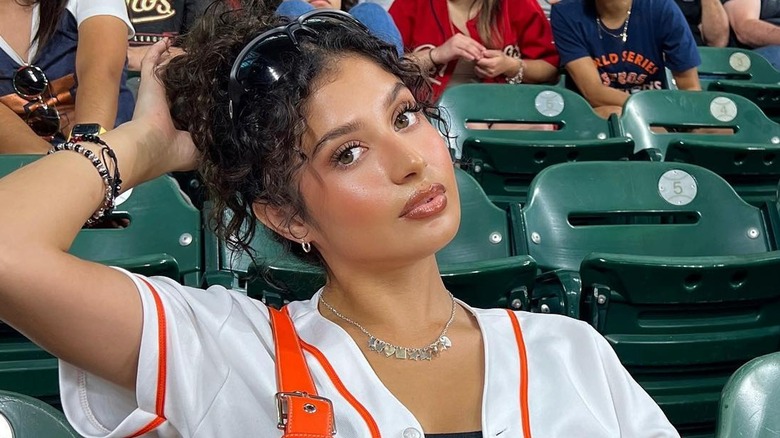What We Can Learn From TikToker's Viral Public Shaming Of Two Women Who Didn't Deserve It
America's favorite two pastimes, baseball and TikTok, collided in a viral moment after an influencer was allegedly mocked for taking selfies during an April 19, Houston Astros game. Jackie La Bonita was recording herself on video and taking pictures during the game, prompting the attention of two women seated behind her. The women proceeded to reportedly mock La Bonita, laughing, photobombing the pictures, and even giving the middle finger to the camera. La Bonita then uploaded an edited video to TikTok with the caption "Please be nice" and the hashtags #meangirls and #meangirlvibes. The video has garnered more than 46 million views and almost 8 million likes. As such, the fallout was intense.
Some criticized La Bonita for filming in public without the consent of those who were in the shot — which is generally not against the law. Others shamed the women for their behavior. But some took it a step further, apparently identifying the women in the video, college students Litzareli Madrigal and Alondra Poullet, and contacting their jobs, stating they should be fired. While calling out bad behavior can be a strong deterrent against the behavior repeating, the internet has a tendency to take things too far. Madrigal and Poullet said in a joint TikTok video response that they had been doxxed and that they had received death threats.
Call-out culture can go too far
Madrigal and Poullet said in their joint video response that they never mocked or bullied La Bonita, that they had no idea who La Bonita was, and did not immediately realize the camera was filming her. From their perspective, they shared, they saw a man pointing a camera in their direction for several minutes and assumed they were being filmed. Madrigal also stated that the middle finger was not toward La Bonita, but the camera. They said they had no idea La Bonita was reacting to them until her video was posted. "I don't feel like our safety should be put at risk for something that was misinterpreted and put out of context," Madrigal said.
Much like how the viral TikTok "Gymcreep" trend garnered polarizing opinions, the internet had much to say about the pair's response. Comments on the video are largely negative, accusing the two women of being dishonest about how the situation went down. While accountability is important, their joint video response has begged the question: what does accountability look like when an incident captured on camera is edited and goes viral? Does cyber-bullying the women for allegedly bullying La Bonita really achieve progress? This so-called "call-out" culture can be productive under some circumstances. But it can also be used to perpetuate further harm under the guise of self-righteousness. Sometimes it also causes the public to over-punish, thus making alleged aggressors into victims.
Addressing issues of privacy
No matter where the internet places blame, jeopardizing someone's financial stability via contacting their job, as well as doxxing them and exposing their personal information to the public, are extreme acts that should not be taken lightly. Doxxing can open victims up to harassment, and create even more victims out of their friends, family members, and colleagues who were uninvolved. While some social media users claim that the women are receiving what they deserve for their actions, others maintain that doxxing the women goes too far.
One TikTok user, Karen (@kareniskarma), says to the women in a TikTok video that they "need a little taste of your own medicine." Another TikTok user (@sanilarena), however, questioned the function of normalizing extreme measures such as informing someone's workplace about their behavior in her TikTok video. "Sounds like you're advocating for your job to extend surveillance to your out-of-work activities," the text reads. Although, employers can hold workers responsible for many behaviors outside of work if they are at-will employees.
While it is not illegal to film private citizens in public — where one cannot realistically claim they have a right to privacy — the act of filming in public, without the consent of those in the video, is increasingly being challenged. As such, the conversation surrounding privacy online and cyberbullying is far from over.
